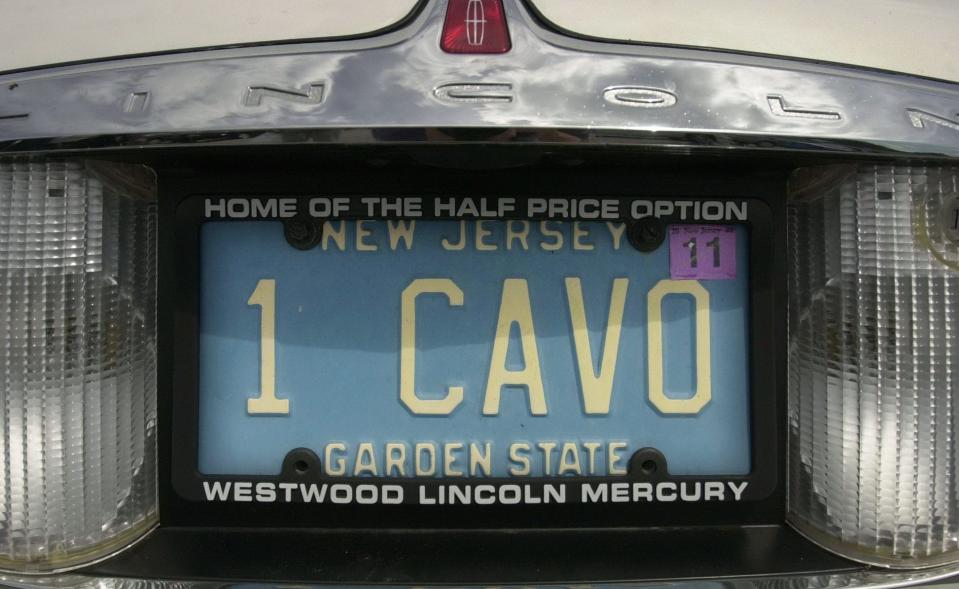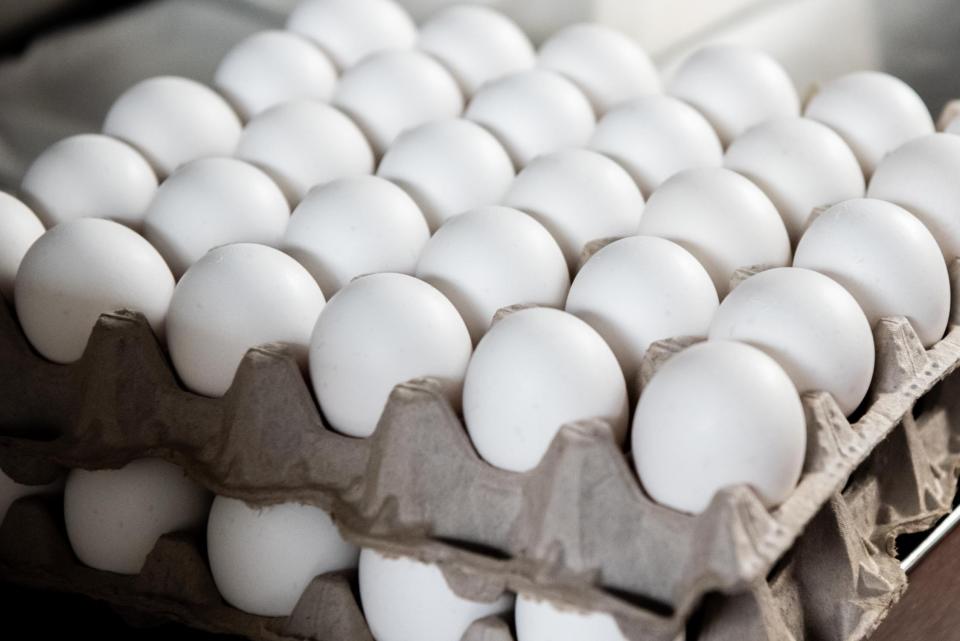See how New Jersey narrowly escaped being known as 'the Egg State'
When New Jersey lawmakers announced a bipartisan effort to stamp "Garden State" on license plates 70 years ago, they were nearly left with egg on their faces.
Two governors vetoed the bill before the plates finally appeared in 1959. Meanwhile, there were groups around the state keen on ousting what they claimed was a stale nickname. Some Republican legislators even wanted to rename the Garden State Parkway, then under construction, after Gov. Alfred Driscoll.
The circumstances arose from New Jersey's evolution.
In 1950, New Jersey had about 1.7 million acres of farmland, or about 1.1 million fewer than in 1900, according to U.S. census records. Less than one-fifth of the population lived in rural areas. The biggest moneymaker in state agriculture was the egg.
If anything should be on the license plate, egg farmers and officials with the New Jersey Poultry Council at the time said, it should be the egg.
Suggestions included "the Egg State" and "Home of the Jersey Egg." Lobbyists also wanted the figure of an egg on every license plate.
Months earlier, in August 1953, Driscoll vetoed a bill calling for the state's license plates to bear the now-standard legend "Garden State." There were concerns that the plates, which then were a few square inches smaller, wouldn't hold the extra markings. However, the main sticking point proved to be Driscoll, who said license plates had but one job. They should do it well and stop there, he reasoned. Adding a slogan would increase costs for no tangible purpose.
"New Jersey license plates aren't going to be cluttered up with the very uninspiring announcement that ours is the Garden State," The Passaic Herald-News editorial staff wrote after the veto. "That's good. If the trend toward placing slogans on license plates continues, New Jersey plates will eventually stand out."

By then, New York plates were marked "The Empire State." Others, including Georgia, Florida, Maine, New Mexico and Wisconsin, had their slogans, meant to suggest "the grass is indeed greener over here."
The trend had momentum, and Driscoll had but a limited time to resist it. A new governor was incoming in 1954, and the bill was expected to return.
Legislators advanced their license plate demand in the summer of 1954 to new Democratic Gov. Robert Meyner, who promptly vetoed it.
"I do not believe that the average citizen of New Jersey regards his state as more peculiarly identifiable with gardening or farming than any of its other industries or occupations," he said, ignoring nearly a century of New Jersey being dubbed "the Garden State."
The state's legislators were unmoved by Meyner's argument. By the end of 1954, they had overridden his veto. Three years later, New Jersey adopted the North American standard license plate template of 12 inches by 6 inches, but it wasn't until 1959 that the orange-on-black color scheme was ditched for black on "buff" and the legend "Garden State" was added to the bottom of the plate.
The state website credits Abraham Browning of Camden for making New Jersey the "Garden State." A 2017 bill designating that as the official New Jersey state slogan said Browning made the phrase popular during his speech at the Philadelphia Centennial exhibition on New Jersey Day in August 1876.
However, that claim from Alfred Heston, a newspaper veteran, wasn't published until 50 years after the speech. According to the Philadelphia Inquirer and other sources, there is no record of Browning uttering the phrase in August 1876 despite press coverage of his speech.
There are nonetheless several textbooks and nonfiction publications from the 1860s and early 1870s that refer to New Jersey as the "Garden State."
"The little state of New Jersey may perhaps be fitly called the 'garden state,'" George Makepeace Towle, the U.S. consul in Bradford, England, wrote in his 1869 book "American Society."
"Its fruits and vegetables are nowhere excelled; its peaches, pears, grapes, sweet potatoes are especially renowned," he wrote.
But New Jersey wasn't alone. The moniker "garden state" was once used to describe a bunch of states where agriculture flourished, including Ohio, Kentucky, Iowa, New Hampshire, Kansas and Illinois.
Illinois most prominently took the name the "Garden State of the Union" and was mentioned as such in newspapers as far away as Australia in the mid-1850s.

In those times, every city had a fanciful nickname. Chicago, yet to become the "Windy City," was the "Garden City." Illinois thus became the "Garden State," a name adopted by a newspaper in Loda, Illinois, in 1856. By the end of the decade, Garden State Bank would further cement the state's claim.
The nickname was established across the globe as Illinois' when an August 1857 editorial in the West Jersey Pioneer asked: "What is there to hinder this state from being made in a very few years, the garden state of the union?"
More: Hey, Gov. Murphy, the time has come to reimagine the Meadowlands Arena | Cooper
The tide would start to turn in 1860 when real estate ads in the East began touting Illinois as the "Garden State of the West." Agents in the farmlands of South Jersey saw an opening. In August 1861, ads in Vermont newspapers boasted of fertile farmland 25 miles from Philadelphia in the "Garden State of the East." The "East" was soon dropped, and by the end of the Civil War, New Jersey had been named the "Garden State."
"New Jersey has been justly styled 'the Garden State,' from which Pennsylvania and New York draw their principal supplies," the West Jersey Pioneer proclaimed in October 1865.
The nexus of the name dates back to the earliest Colonial days, when New Jersey was divided into the English "West" and the Scottish "East." To fuel colonization, the land was marketed in Scotland as one of promise and plenty, said George Pratt Insh's 1922 book "Scottish Colonial Schemes."
Endorsements were printed in booklets. Posters were made. Maps were published. Among the propaganda was a printed broadside with a dubious claim that the colony had been dubbed "the Garden of the World" by an atlas maker.
Though acreage for farming has dropped to about 750,000 in the Garden State, New Jersey continues to provide produce at relatively large scales. Among the 50 states, New Jersey ranks among the top five producers of asparagus, peaches, bell peppers, cranberries, tomatoes, spinach and eggplant.
In 2022, New Jersey provided for about 16% of asparagus sales among the 50 states. It accounted for 8% of all squash and bell peppers and about 6.5% of all cranberries and blueberries, U.S. Department of Agriculture records show.
This article originally appeared on NorthJersey.com: See how New Jersey narrowly escaped being known as 'the Egg State'

